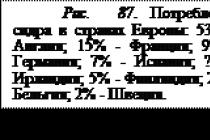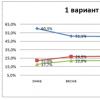To date, to draw up between the employer and the employee, regulating working conditions, is a fairly simple procedure. However, such a document has many nuances and certain subtleties.
For example, the right of the employer to require the employee to continue to perform his work duties for a period of time longer than a normal working day. In this case, the employee automatically raises the question of whether how much overtime work should not exceed.
Dear readers! Our articles talk about typical ways to resolve legal issues, but each case is unique.
If you want to know how to solve exactly your problem - contact through the online consultant on the right or call by phone free consultation:
Article 99 of the Labor Code of the Russian Federation contains information on the conditions that give the employer the right to include an employee in the work process during overtime.
The first paragraph of article 99 describes cases when this can be done with the consent of the employee in writing, and in the second, when an individual is obliged to go out overtime even in the absence of consent on this.
As an additional source, we advise you to be guided by article number 152, also located in the Labor Code, in which you can read about payment rules labor to individuals who perform their labor duties overtime.
What is overtime?
If the employee has completed his work shift, the duration of which has come to an end, and the employer insists that the employee continue to work for some more period of time, then the mode of such work is called overtime.
Its total duration for each employee is limited four hours for a total period of two consecutive business days.
Whether work on weekends and holidays is considered overtime, read ours.
All hours that were worked out in volumes exceeding the daily norm are subsequently summed up. After that, on the basis of the received figure, a cash bonus to wages is calculated. In some cases, for such hours, an employee can be provided right of rest.
The exact amount of the amount of the monetary allowance, which is due to individuals for overtime work, must be previously agreed with the employer and then spelled out in an employment agreement or a collective type agreement. Sometimes the amount of payment is entered into the local documents of the organization.
Download a sample collective agreement for free.
What are the restrictions?
In accordance with the current legislation of the Russian Federation, overtime work can be assigned not all categories of individuals.
Certain rules have also been adopted regarding the length of such a day and some installations of an additional nature. For this reason, we invite you to familiarize yourself with with current restrictions regarding overtime work:
- A ban has been introduced on engaging in work, the duration of which is longer than the generally accepted norm of the working day, employees who are in position, individuals who have not reached the age of majority, as well as some other groups of individuals, a ban on overtime work, which is established with the help of other federal laws.
- There are some restrictions on the involvement of individuals who are disabled due to disability, as well as for employees with children who have not yet reached the age of three.
In order to assign overtime hours for this group of people, you must first familiarize yourself with their right to refuse from such labor, and then receive from them a signature on the corresponding document.
Then follows issue consent, indicating that the employee belonging to this category of persons does not object to overtime involvement.
And as a final step, employees must provide certificate from a medical institution, which confirms the fact that the state of health allows the employee to perform his duties.
The employer does not have the right to engage an employee overtime if he does not have the consent of the latter, and also the reason for engaging is not included in the list of reasons described in the first and second parts of Article 99 of the Labor Code.
Moreover, this rule applies absolutely all categories individuals.
Number of overtime hours per month
 For the majority of persons performing their labor duties in overtime mode, the question of whether the employer’s actions to attract them is legal is quite relevant, as well as, How many hours of overtime can you work in a month?
For the majority of persons performing their labor duties in overtime mode, the question of whether the employer’s actions to attract them is legal is quite relevant, as well as, How many hours of overtime can you work in a month?
Article number 91 of the Labor Code establishes the norm for the duration of the working day on the territory of the Russian Federation, which is 40 hours a week. Thus, all the time during which an individual, on the initiative of the employer, works more than the specified norm, is considered for him overtime.
It should also be noted that if an individual is delayed at the workplace not at the direction of the employer, but at his own request, then this time is not considered overtime.
However, for a certain group of employees shortened program working hours:
- For employees, individuals with the first and second groups of disability, as well as workers working in conditions that pose a risk to life and danger to health (Article 92 of the Labor Code).
- For employees performing their labor duties in the northern part of Russia (Article 320), for individuals working as teachers (Article 333) and employees involved in the physical, psychological and social health of a person (Article 350).
 For the above employees, with the help of an employment contract, a special duration of overtime work process is established, which slightly less than the generally accepted weekly norm equal to 40 hours.
For the above employees, with the help of an employment contract, a special duration of overtime work process is established, which slightly less than the generally accepted weekly norm equal to 40 hours.
Consider the calculation of the maximum allowable number of overtime hours per month, using a specific example.
A certain Novikov Petr Vasilievich, working as a subway driver, has been working for five days a week, and on the terms of the same number of hours for each shift, and rests for two days.
Therefore, dividing the number of the generally accepted hourly rate (40 hours) by 5 shifts, we get that the duration of one working day for him is 8 ocloc'k.
For technical reasons, employee Novikov was late every shift for 2 hours, which just did not contradict the maximum allowable hourly rate established by Article 99 of the current code (the maximum number of hours for two working days in a row is 4 hours).
In January 2017, he worked 22 shifts and each of them was delayed by the maximum allowable number of hours, equal to the number 2. Multiplying this number by 22 days, we get that 44 hours is the maximum number of hours that a Novikov employee can work in a month in accordance with the provisions of the Labor Code.
What is the maximum allowed number of hours per year?
Russian law, namely 56 articles of the Labor Code, a certain norm of the maximum number of hours per year is established.
It is 120 hours for one employee.
To ensure that this annual norm does not exceed the limit, the employees who hold administrative positions in the organization for which the employee works are responsible.
 Their duties include the implementation of the calculation, strict control and fixation of the amount of time during which an individual works in overtime at the initiative of the employer.
Their duties include the implementation of the calculation, strict control and fixation of the amount of time during which an individual works in overtime at the initiative of the employer.
Thus, if an employee has already been involved in overtime work, for 5 months in the number of hours equal to the number 24 per each per month, the employer no longer has the right to offer him overtime for that year.
Since the product of the monthly number of hours exceeding the norm of the working day (24 hours) and the number of months when the employee went overtime, just equals 120 hours, which is the maximum number of overtime hours per year by law.
Cumulative duration of time
As you know, not all organizations conduct the same type of activity, and there is a whole list of professions for which special work schedule.
For example, for professions such as a librarian, an office worker, a salesperson, a real estate consultant, and some other similar activities, it is quite easy for an employer to set the exact number of hours per shift.
Thus, if an employee works on a six-day schedule, then given the fact that the maximum amount of working time per week is 40 hours, the duration of his shift should not exceed six and a half hours.
However, there are also such professions, the type of activity of which does not allow introducing clear limits for the duration of one work shift for workers. These include persons working as security guards, firefighters, policemen, doctors, and so on.
If the total number of hours worked by an employee overtime is calculated not for a weekly period, but for a slightly longer period, then this method of fixing overtime hours is called summarized.
However, the number of overtime hours at the same time must comply with the norms established by law. It is necessary to establish summarized accounting with the help of certain documents.
The employer is required to issue a document in writing fixing the conditions of overtime work, its duration, schedule, as well as the duration of the accounting period for which the hours worked in excess of the norm are counted.
Time tracking - examples
Now we propose to move on to illustrative examples regarding the accounting for time worked overtime.
Consider the most primitive example showing how hours worked in excess of the norm for professions are kept. with clear time frames set for one working day. In this case, accounting is kept for a week and can be scheduled by day:
Monday The employee worked an eight hour shift.
Tuesday- the employee worked for an eight-hour shift and after it for another hour.
Wednesday Thursday Friday- the employee completed the daily amount of work in eight hours and stayed at work for another two hours.
Saturday Sunday- official holidays prescribed by the terms of the employment contract.
 Since 40 hours is the maximum number of working hours per week, minus two days off, the normal length of one day is 8 ocloc'k. The rest of the time is overtime, summing up the hours worked in excess of the norm, we find that their total number in this case is equal to the figure seven.
Since 40 hours is the maximum number of working hours per week, minus two days off, the normal length of one day is 8 ocloc'k. The rest of the time is overtime, summing up the hours worked in excess of the norm, we find that their total number in this case is equal to the figure seven.
Now let's move on to the example of the summarized overtime accounting, only we will consider not a weekly period, but a certain accounting period:
September. For 4 weeks, a total of 170 hours were worked, so multiplying 40 by 4 weeks, we get that the maximum number of hours is 160. So 10 hours is overtime.
October. For 4 weeks, the employee worked for 180 hours and one shift (8 hours) fell on an official holiday. Such a shift must be included in the weekly rate. Then, subtracting the number 160 from 188, we get that the duration of overtime is 28 hours.
After that, in order to carry out the summed accounting procedure, it is simply enough to add up the overtime hours for September and October. By doing this, we get 38 overtime hours for a given settlement period.
The accounting procedure must be carried out by administrative employees working in the same organization as the employee who works overtime.
A video clip will help you deal with the nuances of overtime work:
New edition Art. 99 Labor Code of the Russian Federation
Overtime work is work performed by an employee at the initiative of the employer outside the working hours established for the employee: daily work (shift), and in the case of summarized accounting of working time - in excess of the normal number of working hours for the accounting period.
Involving an employee in overtime work by an employer is allowed with his written consent in the following cases:
2) when performing socially necessary work to eliminate unforeseen circumstances that disrupt the normal functioning of centralized hot water supply, cold water supply and (or) water disposal systems, gas supply, heat supply, lighting, transport, communications systems;
Commentary on Article 99 of the Labor Code of the Russian Federation
Overtime work is work performed by an employee at the initiative of the employer outside the established working hours, daily work (shift), as well as work in excess of the normal number of working hours for the accounting period.
In case of daily accounting of working time, work in excess of the established length of the working day is considered overtime.
In the aggregate accounting, overtime will be considered work in excess of the established duration of the work shift.
Usually, an order is issued on the production of overtime work, which specifies the reasons why they are necessary, the categories of workers involved in the work. However, if such an order is not issued, but there was an oral order from one of the representatives of the administration, then the work is recognized as overtime.
Overtime work is recognized in practice even when it was carried out not only with the knowledge of the employer, but also with the immediate supervisor of the work (foreman, site manager, etc.). However, in all cases, involvement in overtime work is possible only with the written consent of the employee.
Work is recognized as overtime, regardless of whether it was included in the scope of the employee's duties or not.
It is not overtime work, in which the actual duration of daily work on certain days may not coincide with the duration of the shift according to the schedule.
Overtime work in excess of the established working hours is not recognized when working out the norm of hours with a flexible work schedule, which will be discussed in the section on working hours.
Work in excess of the stipulated length of the working day of employees with irregular working hours, if it is compensated by additional leave for more than 28 calendar days, is not considered overtime.
The overtime work is not considered during the hours of the vacation without saving wages, as well as the work performed in part -time (in excess of the established working hours), the work performed by the employee in excess of the time provided for by the employment contract, but within the established duration of the working day (shift) operating an incomplete working day (the resolution of the Plenum of the Supreme Court of November 24, 1978 N 10 "On the application of the laws that regulates the payment of payment for the payment of payment labor of workers and employees ").
Does not apply to overtime and work in the order of combining professions (positions) (Article 151 of the Labor Code of the Russian Federation).
Work under civil law contracts (for example, assignments, paid services, contracts, etc.), carried out in free time, does not apply to overtime.
Involvement in overtime work is carried out by the employer with the written consent of the employee and does not require permission from the representative body of employees in the following cases established by Article 99 of the Labor Code of the Russian Federation:
1) if necessary, perform (finish) the work that has been started, which, due to an unforeseen delay due to the technical conditions of production, could not be performed (completed) within the working hours established for the employee, if the failure to perform (non-completion) of this work may lead to damage or destruction of the property of the employer (including the property of third parties held by the employer, if the employer is responsible for the safety of this property), state or municipal property, or create a threat to life and health of people;
2) in the performance of temporary work on the repair and restoration of mechanisms or structures in cases where their failure may cause the termination of work for a significant number of employees;
3) to continue work in the absence of a replacement employee, if the work does not allow a break. In these cases, the employer is obliged to immediately take measures to replace the shift with another employee.
Engaging an employer of an employee to work overtime without his consent is allowed in the following cases:
1) in the performance of work necessary to prevent a catastrophe, industrial accident or eliminate the consequences of a catastrophe, industrial accident or natural disaster;
2) when performing socially necessary work to eliminate unforeseen circumstances that disrupt the normal functioning of water supply, gas supply, heating, lighting, sewerage, transport, communications;
3) in the performance of work, the need for which is due to the introduction of a state of emergency or martial law, as well as urgent work in emergency circumstances, that is, in the event of a disaster or threat of disaster (fires, floods, famine, earthquakes, epidemics or epizootics) and in other cases that endanger the life or normal living conditions of the entire population or part of it.
In other cases, involvement in overtime work is allowed with the written consent of the employee and taking into account the opinion of the elected body of the primary trade union organization.
It is not allowed to involve pregnant women, employees under the age of eighteen, other categories of employees in overtime work in accordance with this Code and other federal laws. Involvement in overtime work of disabled people, women with children under the age of three, is allowed only with their written consent and provided that this is not prohibited by them for health reasons in accordance with a medical certificate issued in accordance with the procedure established by federal laws and other regulatory legal acts of the Russian Federation. At the same time, disabled people, women with children under the age of three, must be familiarized with their right to refuse overtime work against signature.
These guarantees are also extended to employees with disabled children under the age of 18; workers caring for sick members of their families in accordance with a medical report (part 2 of article 259 of the Labor Code of the Russian Federation); fathers raising children of the appropriate age without a mother, and guardians (custodians) of minors (Article 264 of the Labor Code of the Russian Federation).
The duration of overtime work should not exceed for each employee 4 hours for two consecutive days and 120 hours per year.
It is the employer's responsibility to ensure that each employee's overtime hours are accurately recorded.
In other cases, in addition to those specified in Article 99 of the Labor Code of the Russian Federation, involvement in overtime work is allowed in addition to the written consent of the employee, taking into account the opinion of the representative body of employees. That is, the Labor Code of the Russian Federation establishes a double guarantee against the unreasonable involvement of employees in overtime work.
With regard to a certain category of workers, a direct ban on involvement in overtime work has been established.
Very often, overtime work is confused with the so-called "irregular working day". The latter is a condition of an employment contract concluded with certain categories of workers (usually managers, specialists) and consisting in the fact that on certain days, if necessary, these workers can be involved in work in excess of the length of the working day (shift).
For each individual employee (and not on average for all persons involved in overtime work, not for the organization as a whole), overtime work cannot last more than 120 hours per year and 4 hours for two consecutive days.
In some cases, separate regulations allow higher limits on overtime work. This applies, for example, to employees of railway transport, the subway, certain categories of drivers, forestry workers, etc. In these cases, the rules of special legal acts apply.
So, for example, in paragraph 5 of the Regulations on the peculiarities of the regime of working hours and rest time of communications workers with a special nature of work dated September 8, 2003 N 112, it is indicated that the use of overtime work is allowed in cases provided for in Article 99 of the Labor Code of the Russian Federation, as well as in the following exceptional cases:
1) in the production of urgent work to eliminate accidents on communication lines and station equipment;
2) when performing work on the transportation and delivery of mail and periodicals in cases of delay in railway, air, sea, river and road transport or untimely submission of periodicals by publishing houses;
3) when processing increased telephone, telegraph and postal exchanges on the eve of holidays;
4) when processing orders for periodicals during the subscription campaign;
5) in case of unscheduled delivery of pensions.
Involvement in overtime work in these exceptional cases is allowed with the written consent of the employee and taking into account the opinion of the elected trade union body of the organization.
The Labor Code of the Russian Federation provides for a special procedure for paying overtime. Article 152 of the Labor Code of the Russian Federation regulates the issue of remuneration for workers involved in the established manner for overtime work. Applying the rules of Article 152 of the Labor Code of the Russian Federation, it should be noted that at present:
1) the differences in remuneration of employees involved in overtime work have been eliminated, depending on whether the employee works on the basis of a time-based wage system or works by piece;
2) specific amounts of remuneration for overtime work may be determined in a collective agreement or in an employment contract.
In all cases, for the first 2 hours of overtime work, the employee's work is now paid at least one and a half times, and for the next hours - at least twice the amount. In other words, the rigidly set centralized upper limits of additional pay for overtime work have been abolished. You cannot pay less than the limits established in Article 152 of the Labor Code of the Russian Federation, but you can pay more.
In addition, now it is allowed not only to provide time off for overtime work, but also to add days off to annual leave, release the employee from work on other days for the number of hours for which the employee was involved in overtime work.
Another commentary on Art. 99 of the Labor Code of the Russian Federation
1. Part 1 of Art. 99 defines overtime work. Overtime work is work performed by an employee at the initiative of the employer outside the working hours established for him. In this case, the established length of working time is understood as the length of working time established for this employee in accordance with the Labor Code, other federal laws and other regulatory legal acts of the Russian Federation, a collective agreement, agreements, local regulations, labor contract (Article 97 of the Labor Code of the Russian Federation).
With the summarized accounting of working hours (see Article 104 of the Labor Code of the Russian Federation and commentary thereto), overtime is considered to be work in excess of the normal number of working hours for the accounting period.
2. Only work performed at the initiative of the employer may be considered overtime work. Work outside the working hours established for the employee, performed not at the initiative of the employer and without his knowledge, cannot be considered as overtime work.
3. Since the use of overtime work leads to the excess of the norm of working time, the legislation establishes legal guarantees that ensure its limitation. These guarantees are:
a) establishment of lists of circumstances under which, in order to involve an employee in overtime work:
his consent is not required;
the written consent of the employee is required;
b) the introduction of a complicated procedure for engaging in overtime work in other cases;
c) limiting the duration of overtime work for one employee;
d) establishment of a circle of persons who cannot be involved in overtime work.
4. The list of circumstances that give the employer the right to involve employees in overtime work without their written consent is given in Part 3 of Art. 99 of the Labor Code of the Russian Federation. This refers to emergency circumstances that endanger the life or normal living conditions of the population or part of it, the performance of work necessary to prevent disasters, industrial accidents, eliminate the consequences of catastrophes, accidents and natural disasters, the performance of socially necessary work to eliminate violations of life support systems.
5. Part 2 of Art. 99 lists the cases when the involvement of employees in overtime work is allowed only with their consent. Such cases include the need to complete the work that has been started if its failure to do so may lead to serious consequences, the performance of temporary work to repair and restore mechanisms or structures, the failure of which may cause a significant number of employees to stop working, as well as the continuation of work if the replacement employee does not appear, if the work does not allow a break.
6. Finally, part 4 of Art. 99 provides for the possibility of involving employees in overtime work in other cases in addition to the emergency and unforeseen circumstances listed in the article. The absence in the Code of specifying the concept of "other cases" allows the employer to raise the issue of applying overtime work in case of any complications in the activities of the organization, individual entrepreneur. As an additional guarantee of limiting overtime work in the absence of emergency or unforeseen circumstances under Parts 2 and 3 of Art. 99 of the Labor Code, along with obtaining the written consent of the employee, there is also a requirement to take into account the opinion of the elected body of the primary trade union organization.
The decision of the employer to apply overtime work is not a local normative act, and the Labor Code of the Russian Federation does not establish a procedure for taking into account the opinion of the elected body of the primary trade union organization for such cases (see Article 371 of the Labor Code of the Russian Federation and commentary thereto). The requirement to take into account the opinion of the elected body of the primary trade union organization may in this case be considered fulfilled if the employer has notified this body in advance of the need to apply overtime, the grounds for which such a need arose, and the volume (duration) of overtime work; when making a final decision, the employer must have the opinion of the trade union body. Taking into account the opinion of the elected body of the primary trade union organization does not mean that the employer must agree with this opinion.
If the elected body of the primary trade union organization and the employer consider it necessary to regulate the procedure for taking into account the opinion of the trade union body in cases where such a procedure is not defined by the Labor Code, they can do this in a collective agreement.
7. Persons who cannot be involved in overtime work include pregnant women, employees under the age of 18, other categories of employees in accordance with the Labor Code and other federal laws.
8. With regard to women with children under the age of three, as well as disabled people, the Labor Code, allowing in principle to involve them in overtime work, established a special procedure for involving them in such work: in addition to obtaining the written consent of the employee, the employer must in writing familiarize him with the right to refuse overtime work (part 5 of article 99 of the Labor Code of the Russian Federation). The same procedure for engaging in overtime work is established for mothers and fathers raising children under the age of five without a spouse, workers with disabled children, and workers caring for sick members of their families in accordance with a medical report, as well as for fathers raising children without a mother, guardians (custodians) of minors (see Articles 259, 264 of the Labor Code of the Russian Federation).
9. The requirements of the law on obtaining the written consent of the employee to involve him in overtime work and on familiarizing the employee in writing with the right to refuse overtime work must be fulfilled by the employer every time when there is a need to involve employees of the relevant categories in such work.
10. By prohibiting the involvement of underage workers in overtime work, the Labor Code established an exception to this general rule: under the age of 18, creative workers and professional athletes whose professions are indicated in the lists established by the Government of the Russian Federation, taking into account the opinion of the Russian tripartite commission for the regulation of social and labor relations, may be allowed to work overtime (see Article 268 of the Labor Code of the Russian Federation and commentary thereto).
11. Established part 6 of Art. 99 of the Labor Code of the Russian Federation, the maximum limits for the duration of overtime work: four hours for two consecutive days and 120 hours per year - cannot be exceeded.
12. Non-compliance by the employer with the obligation to keep accurate records of overtime work performed by each employee is a violation of labor legislation and should entail the responsibility of the employer, but cannot lead to infringement of the rights of the employee. The employee has the right to demand payment for overtime work even if they are incorrectly executed or not taken into account.
13. Overtime work is paid for the first two hours of work at least one and a half times, and for the following hours - at least twice. Specific amounts of payment may be determined by a collective agreement or an employment contract. At the request of the employee, instead of increased pay, overtime work can be compensated by providing additional rest time, but not less than the time worked overtime (see Article 152 of the Labor Code of the Russian Federation and commentary thereto).
It happens that the employer is forced to involve employees in work outside the established working hours for them, for example, in the evenings with a normal 8-hour working day or on weekends. Such work is (Article 97 of the Labor Code of the Russian Federation):
- or overtime;
- or work on irregular working hours.
Let's talk about overtime hours and see what is the allowable amount of overtime for each employee.
Processing under the Labor Code
Overtime hours are work performed by an employee (Article 99 of the Labor Code of the Russian Federation):
- firstly, at the initiative of the employer;
- secondly, outside the duration of daily work (shift) established for the employee, and with the summarized accounting of working time - in excess of the normal number of working hours for the accounting period.
As you can see, in order to recognize overtime work, both conditions must be met. For example, if an employee performs some work at the end of his working day on his own initiative, then such work is not overtime and should not be paid as overtime (Letter of the Ministry of Labor of 05.03.2018 N 14-2 / B-149). In addition, for such work, the employer is not obliged to provide the employee with additional days of rest (Letter of Rostrud dated 03/18/2008 N 658-6-0).
Note that involvement in overtime work should not be systematic (Letter of Rostrud dated 07.06.2008 N 1316-6-1). That is, the employer must initially plan the work of employees so as not to include processing in the work schedule.
How many hours per month can you work under the Labor Code
The duration of overtime work should not exceed 4 hours for each employee for 2 consecutive days. There is another restriction: overtime work should not exceed 120 hours per year for each employee (Article 99 of the Labor Code of the Russian Federation).
In cases where a summarized accounting of working hours is established for an employee, it is important to consider the following. The employer determines the accounting period in the internal labor regulations: a month, a quarter or another period up to a year (Article 104 of the Labor Code of the Russian Federation). The norm of working hours for the accounting period must be equal to the norm established for the corresponding category of employees, but not exceed 40 hours per week. And only at the end of the accounting period it will be clear whether any work was overtime for the employee and whether it should be paid additionally.
For example, for an employee, the accounting period is a quarter. The norm of working hours with a 40-hour working week in the first quarter of 2020 is 456 hours. Suppose a person worked 458 hours during this period. So 2 hours should be paid as overtime. We talked about overtime pay with a summarized accounting of working time.
And it is important to know the following. Even if the number of overtime hours worked by an employee is more than the maximum specified by the Labor Code, the employer must still pay for such processing in full (Determination of the Constitutional Court of December 19, 2019 N 3363-O).
Overtime work under harmful working conditions
Workers employed in jobs with harmful working conditions are assigned a reduced 36-hour work week. Can they work overtime? According to the general rules, it is possible if the following conditions are met (Article 99 of the Labor Code of the Russian Federation):
- employees have given written consent to perform overtime work, or this is an exceptional case of engaging in overtime work, when the consent of the employee is not required;
- overtime work must not exceed the maximum duration given above.
When you read the provisions of the Labor Code regarding overtime work, as well as working on weekends, they seem extremely simple. However, in practice, their application causes many difficulties.
What is written in the Labor Code ...
So, let's first see what is written in the Labor Code.
Overtime work - work performed by an employee at the initiative of the employer outside the established working hours, daily work (shift), as well as work in excess of the normal number of working hours for the accounting period (according to Part 1 of Article 99 of the Labor Code of the Russian Federation).
In part 5 of the same article 99 of the Labor Code of the Russian Federation it is written that overtime work should not exceed four hours for each employee for two consecutive days and 120 hours per year.
Article 152 of the Labor Code of the Russian Federation states that overtime work is paid for the first two hours of work at least one and a half times, for subsequent hours - at least double the amount.
According to article 153 of the Labor Code of the Russian Federation, work on a day off and a non-working holiday is paid at least twice the amount:
- pieceworkers - at least at double piecework rates;
- employees whose work is paid at daily and hourly rates - in the amount of at least double the daily or hourly rate;
- employees receiving a monthly salary - in the amount of at least a single daily or hourly rate in excess of the salary, if work on a weekend and non-working holiday was carried out within the monthly norm of working hours, and in the amount of at least a double hourly or daily rate in excess of the salary, if the work was performed in excess of the monthly norm.
Let's explain these rules with simple examples.
So, we brought the norms of the Labor Code. Now we will try to explain with simple examples how to apply these provisions.
What is overtime
So, overtime work is work performed by an employee at the initiative of the employer outside the established working hours:
- daily work (shift) (see Example 1), as well as
- work in excess of the normal number of working hours for the accounting period (see Example 2).
Overtime restrictions
Overtime work must not exceed four hours for each employee on two consecutive days and 120 hours per year. In this norm, too, at first glance, everything is simple.
Overtime pay
Overtime work is paid for the first two hours of work at least one and a half times, for subsequent hours at least twice the amount. Well, here, too, everything seems very simple.
Continuation of Example 3
Continuation of Example 4
Continuation of Example 2
Weekend payment
Work on weekends and non-working holidays is paid at least twice:
- pieceworkers - at least at double piecework rates (see Example 8);
- employees whose work is paid at daily and hourly rates - in the amount of at least double the daily or hourly rate (see Example 9);
- employees receiving a monthly salary - in the amount of at least a single daily or hourly rate in excess of the salary, if work on a weekend and non-working holiday was carried out within the monthly norm of working hours, and in the amount of at least a double hourly or daily rate in excess of the salary, if the work was performed in excess of the monthly norm (see Example 10).
Using simple examples, we explained how the norms of the law work. And now we will analyze the "tasks" more difficult.
Are overtime and weekend work the same thing?
So, it would seem that everything is simple, but in fact the norms of our legislation are drawn up in such a way that we often do not know how to apply them. Let's think about whether the concepts of "overtime work" and "work on weekends" are identical? If we try to answer this question, it will be found that in some cases we equate these concepts with each other, and in others we consider them to be different from each other. Moreover, we are usually guided by common sense, and not by the literal norm of the law. Let's take a concrete example.
|
Part 5 of Article 99 of the Labor Code of the Russian Federation states that overtime work should not exceed four hours for each employee for two consecutive days and 120 hours per year. Agree, when we read the first half of this sentence, we assume that working weekends and working overtime are completely different things. And the norm, according to which an employee must work no more than 4 hours for 2 days in a row, has nothing to do with weekends. After all, an employee usually works on Saturday or Sunday for 8 hours. But when we read the second half of the sentence (overtime work should not exceed 120 hours per employee per year), most of us start from the diametrically opposite premise, according to which overtime and weekend work are one and the same. And 120 hours includes work on weekends. What are we guided by? Common sense! Although, in order to consider ourselves absolutely right in this situation, Part 5 of Article 99 of the Labor Code of the Russian Federation should have been formulated as follows: overtime work should not exceed four hours for each employee for two consecutive days (if we are talking about working days) and 120 hours a year. |

An even more difficult situation arises when it comes to paying for work on weekends. In simple situations, everything is really clear: if a person works overtime on weekdays, then we pay for the first two hours of work at one and a half times, and the next two at double. If a person is attracted to work on weekends, then wages for all hours will be calculated at a double rate. Reading the rules regarding weekend pay and overtime pay, we are absolutely sure that these are different things and that such work must be paid in different ways. However, usually, if employees are involved in an organization to work on weekends, then they work 8 hours (the same as on weekdays), which are paid double, but not 13, as written in the letter. In this case, the dispute seems to be as follows. Workers who appear to work 8-hour, five-day workweeks have been brought in to work weekends. The organization of the enterprise, having read that Article 153 of the Labor Code of the Russian Federation says that work on a weekend and non-working holiday is paid at least twice, and multiplied the hourly wage rate when paid by 2. The State Labor Inspectorate considered 5 hours that were worked outside of 8 hours of normal working time, overtime. Therefore, in her opinion, processing for the first two hours should be paid according to the formula: double pay for the day off is multiplied by one and a half for overtime work, plus for the next three hours, payment is made according to the formula: pay double (for the day off) multiplied by 2 (for overtime work). The logic seemed strange to the organization, since at first glance it seems that double the amount for working on a day off and so includes payment for the fact that the employee works extra time. Of course, this situation is controversial, from the point of view of legal assessment, because in this case the legislation can be turned this way and that.
Let us turn again to Article 99 of the Labor Code of the Russian Federation, according to which overtime is considered work performed at the initiative of the employer outside:
- Normal working hours.
- Daily work (shift).
- Work in excess of the normal number of working hours for the accounting period.
On the one hand, the logic of the labor inspectorate seems correct. After all, if the duration of daily work (shift) is 8 hours, then all the rest of the time that has gone beyond this limit is work outside the daily work (shift). That is, it must be regarded (see paragraph 2 of the list) as overtime work and paid according to the rules of Article 152 of the Labor Code of the Russian Federation, which states that overtime work is paid for the first two hours of work at least one and a half times, for subsequent hours - at least twice the amount. On the other hand, work on a holiday is always work outside normal working hours (see point 1). Indeed, in this case, a person will work more than 40 hours a week. But no one says that the first two hours of work on a day off must be paid first at a double rate, multiplied by one and a half, and the subsequent hours - at a double rate, multiplied by two. But if the number of hours worked by him does not deviate from the normal duration of the work shift, there is no talk of payment for this day under the rules of Article 152.
Since there is no judicial practice on the application of this article, just as there is no explanation on this issue, it is impossible to say which of the parties is absolutely right. After all, the legislation here can be turned in one direction or the other. In addition, it is not clear: if the extra 5 hours were regarded as overtime, why it was not qualified as an offense, because, in accordance with Article 99 of the Labor Code of the Russian Federation, overtime work should not exceed four hours for each employee for two days in a row. Well, on my own behalf, I can advise: so that such disputes with the labor inspectorate do not arise, do not force the employee to work on a day off for more than normal working hours on weekdays.
How to pay for overtime work and work on weekends with a summarized accounting of working hours?
Document Fragment
|
Article 104 of the Labor Code of the Russian Federation "Summary accounting of working hours" In organizations or when performing certain types of work, where, due to the conditions of production (work), the daily or weekly working hours established for this category of workers cannot be observed, it is allowed to introduce a summarized accounting of working hours so that the working hours for the accounting period (month, quarter and others) do not exceed the normal number of working hours. The accounting period cannot exceed one year. The procedure for introducing the summarized accounting of working time is established by the internal labor regulations of the organization. |

With the payment of overtime work and work on weekends, with the summarized accounting of working hours, problems often arise. So, let's try on simple examples to understand how the payment is made.
Usually, the summarized accounting of working time is kept at enterprises with a shift work schedule. In this case, as a rule, either a year or a month is taken as an accounting period. If in the accounting period the number of hours exceeds the normal working hours, then the first two such hours are paid at one and a half times, the rest - at double.
When drawing up a work schedule, two norms of the Labor Code should be taken into account. Firstly, the norm according to which work for two shifts in a row is not allowed, and secondly, the norm according to which uninterrupted rest must be at least 42 hours a week.
Sometimes, according to the schedule, the working day of an employee working in shifts falls on a generally recognized weekend or holiday. The question arises: how to pay for work on such days, at double or single rates? The following answer can be given to it: if the working day of such an employee falls on a holiday, he should be paid at double rates (even if the number of hours in the accounting period does not exceed the normal number of hours).
As for the days off, the corresponding norm of the Labor Code of the Russian Federation refers to the days off of specific employees, and not about the generally accepted days off in general. In other words, if, for example, some working day of an employee falls on Sunday, it must be paid in a single amount, but if you ask a person to leave on the day when, according to the schedule, he should rest, then this work should be paid in double size (even if the number of hours in the accounting period does not go beyond the normal number of hours).
At some enterprises, management and personnel officers sincerely believe that if a summary record of working time is kept in production, then a person can be forced to go out on his day off, which is due to him according to the schedule, and if the number of hours in the accounting period does not go beyond the normal, pay for such work in a single amount. This approach is absolutely wrong. And if on a generally recognized day off the work of a "shifter" is paid in a single amount, then on his own - with compensation for such injustice - in a double one.
Let's try to understand the situation described by the author of the letter. If we look at the production calendar, we will see that in January the normal working hours are 128 hours. A work schedule was drawn up, according to which the employee had to work 156 hours, including 32 hours of holidays. As we can see, the employee, according to the schedule, must work much more than the normal working hours in January. But since the accounting period is a year, in the following months, in theory, such processing should be compensated (that is, the scheduler should try to make the worker work less than the normal number of hours in February, March, etc.). If a person worked according to the schedule, then we would pay him double the 32 holiday hours, single the remaining hours (156 - 32 = 124 hours). And at the end of the year, we would see if our employee has “extra” hours. If they were available, they would have made an appropriate additional payment (taking into account the fact that the first two hours of overtime work are paid in a single amount, and the next - in a double one). However, the employee worked instead of 156 hours scheduled, 184 hours, that is, 28 hours more! Of all the hours worked, 48 are holidays. In this case, a number of questions arise: why did it happen that the employee did not work according to the schedule? With such a number of hours, was it possible to comply with the requirements of the law, according to which an uninterrupted weekly rest must be at least 42 hours and work for two shifts is not allowed? Without seeing the work schedule and time sheet, one can only assume that the employee went to work on his days off. Accordingly, both 48 hours on holidays and 28 hours on weekends in this case must be paid at a double rate. The remaining hours of work are paid in single. Whether there is processing, which must be paid at an increased rate, you will determine at the end of the year.
Overtime work is work performed at the initiative of the employer outside the working hours established for the employee. In such cases, the specialist is entitled to additional rest or wages in an increased amount. In the article we will tell you how, according to the law, such overtime work is paid. We will also look at examples of how overtime pay is specifically calculated in 2020 with a 40-hour work week and other work schedules.
How much overtime can be
Working hours are determined by the Labor Code of the Russian Federation. Usually they are 40 hours a week, that is, 8 hours a day with a 5-day work week. Other hourly norms of working hours (36 hours, 24 hours) can also be set. If the time for performing official duties goes beyond these norms, then either it is set, or these hours will be considered as overtime work, which is paid separately.
Overtime pay (example)
We note right away that the algorithm for calculating the additional payments that a specialist will receive for overtime work directly depends on the wage system and methods of recording working hours.
Let's consider how overtime hours are paid from July 1, 2018 according to the Labor Code, using specific examples.
Example No. 1. Payment for overtime work according to the Labor Code of the Russian Federation 2020 with summarized time accounting
Insect Alexander works five days a week (40 hours). The salary of a specialist is calculated at an hourly rate in the amount of 200 rubles. In April, processing was recorded - 5 hours. The April norm is 167 hours.
We make the calculation with the summarized accounting of working hours:
- We calculate the total amount of time actually worked per month (norm + processing = 167 + 3 + 2 = 172 hours).
- We determine the hours of processing (fact - norm \u003d 172 - 167 \u003d 5 hours).
- We accrue wages according to the tariff (rate × actually worked out VR = 200 × 167 = 33,400 rubles).
- We calculate the surcharge for the first 2 hours of processing (rate × coefficient 1.5 × 2 hours = 200 × 1.5 × 2 = 600 rubles).
- We calculate the additional payment for the rest of the processing period (rate × coefficient 2 × BP = 200 × 2 × 3 hours = 1200 rubles).
- The total amount of the surcharge is 600 + 1200 = 1800 rubles.
- The total salary for April 2020 was 33,400 + 1,800 = 35,200 rubles.
Example #2: Overtime pay for shift work
Zhuchok Sergey works on a shift schedule. Its mode of operation: 2 working days (10 hours each) and 2 days off, a total of 15 shifts per month. Due to the illness of his partner Zhuchok S.A. worked 5 shifts more than the standard. Wages are charged at an hourly tariff rate of 250 rubles. We make a calculation:
- The working time standard is 15 shifts × 10 hours = 150 hours.
- Actually used BP (15 cm + 5 cm) × 10 hours = 200 hours
- Processing = 200 - 150 = 50 hours
- Salary according to the standard 150 hours × 250 rubles. = 37,500 rubles.
- Surcharge for processing - 24,750 rubles. (750 + 24,000) or (2 hours × 1.5 × 250 + (50 hours - 2 hours) × 2 × 250).
- Total monthly salary = 62,250 rubles. (37,500 + 24,750).
Example No. 3. Recycling on holidays
Strekoza Irina Petrovna works as an accountant (five days for 8 hours a day). In May 2020, the standard for working BP for Strekoza I.P. - 20 working days (159 hours). The official salary of an accountant is 50,000 rubles. per month or 314.47 rubles per hour (50,000 / 159). According to production needs, the accountant Strekoza I.P. worked overtime on May 8 at 10 a.m. and May 9 at 11 a.m.
Step 1. Calculate processing hours:
- for May 8, 3 hours (10 am – 7 am). We take into account only 7 hours, since the pre-holiday day is shortened;
- for May 9, 11 am - this is work on holidays, therefore, it is calculated exclusively in double size and is not included in the calculation of overtime.
Step 2. We consider the salary according to the standard.
For a fully worked month, Strekoze I.P. salary of 50,000 rubles.
Step 3. We consider the additional payment for work on a holiday.
11 hours × 2 × 314.47 = 6918.34 rubles
Step 4. We calculate the additional payment for overtime work.
For the first 2 hours \u003d 2 hours × 1.5 × 314.47 \u003d 943.41 rubles.
For the rest, BP \u003d (3 - 2 hours) × 2 × 314.47 \u003d 628.94 rubles.
Total: 943.41 + 628.94 = 1572.35 rubles.
Step 5. We calculate the results.
The processing calculator showed that the salary of an accountant for May 2020 = 50,000 + 6,918.34 + 1,572.35 = 58,490.69 rubles.














